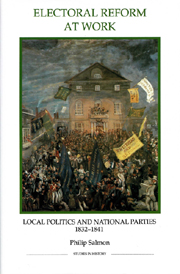Book contents
- Frontmatter
- Contents
- List of illustrations
- List of figures
- List of tables
- Dedication
- Acknowledgements
- Abbreviations
- Introduction
- PART I THE REFORMED ELECTORAL SYSTEM
- 1 Voter registration and the reformed electorate
- 2 Conservative and Liberal electoral organisation
- 3 The election after 1832: tradition and transformation
- PART II THE COUNTIES
- PART III THE BOROUGHS
- Appendices
- Bibliography
- Index
1 - Voter registration and the reformed electorate
from PART I - THE REFORMED ELECTORAL SYSTEM
Published online by Cambridge University Press: 12 September 2012
- Frontmatter
- Contents
- List of illustrations
- List of figures
- List of tables
- Dedication
- Acknowledgements
- Abbreviations
- Introduction
- PART I THE REFORMED ELECTORAL SYSTEM
- 1 Voter registration and the reformed electorate
- 2 Conservative and Liberal electoral organisation
- 3 The election after 1832: tradition and transformation
- PART II THE COUNTIES
- PART III THE BOROUGHS
- Appendices
- Bibliography
- Index
Summary
Of the eighty-two clauses in the Reform Act of 1832, nearly a third dealt with the setting up of a system of voter registration, which was designed to settle who could and who could not vote in parliamentary elections, well in advance of any contest that might take place. Despite frequent complaints, mainly by Tory MPs, that ‘registration had nothing whatever to do with the principle of reform’ and that the Whig government was ‘acting unfairly towards the county in introducing, under the “halo” of the Reform Bill, such an innovation in the whole system of conducting elections’, these clauses attracted remarkably little detailed discussion during the Reform Act's otherwise stormy passage through parliament. Charles Wynn was one of many deeply frustrated critics who ‘should have been glad if the whole subject of registration had been considered with greater attention’. The legislators, however, were convinced that by separating the business of claiming the vote from the business of casting it, registration would reduce the length and cost of elections, and remove party passion and electoral interests from the process of scrutinising and verifying voters. An election, it was thought, would then no longer be a ‘scene of delay, confusion and expense, all endless and intolerable’. But while the time allowed for an election was drastically reduced, from a previous maximum of two weeks to just two days, the procedure for compiling the new electoral registers actually lasted for over four months.
- Type
- Chapter
- Information
- Electoral Reform at WorkLocal Politics and National Parties, 1832–1841, pp. 19 - 42Publisher: Boydell & BrewerPrint publication year: 2002



